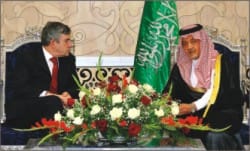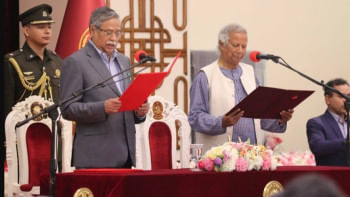Consumer pressure exposes Opec divisions at oil summit

Saudi Foreign Minister Prince Saud al-Faisal (R) meets with British Prime Minister Gordon Brown in Jeddah, Saudi Arabia yesterday. Leaders of global oil powers and consumer nations have gathered in the Saudi Red Sea port city yesterday, seeking ways to control spiralling oil prices seen as a mounting threat to the world economy.Photo: AFP
Consumer nations pressed the main oil powers to increase production at an international summit here Sunday seeking a strategy against spiralling crude prices.
Divisions within Opec were exposed as Saudi Prince announced that his country has increased output to 9.7 million barrels a day and Kuwait said it was ready to follow, but the cartel's president insisted that opening the taps further is not the answer to the price crisis.
The summit was called by King Abdullah as the cost of a barrel of crude recently hurtled towards 140 dollars. Several countries have seen riots and protests against high fuel prices.
The meeting started with talks among the 36 countries and top international institutions and 22 major oil companies on the causes of the surge in prices.
The United States, Germany, India, Australia and other major consumers came to the meeting.
The summit hosts and other top providers were demanding action against "speculators" that they blame for the astonishing rise over the past year.
US Energy Secretary Samuel Bodman insisted that "there is no evidence that we can find that speculators are driving futures prices" to current record heights.
He said market fundamentals show that production has not kept pace with growing demand for oil, resulting in increasing -- and increasingly volatile -- prices.
"In the absence of any additional crude supply, for every one percent increase in demand we would expect a 20 percent increase in price in order to balance the market," Bodman added.
German Economy Minister Michael Glos said: "We need more oil in the world market quickly to stop the spiralling prices at the gas pumps".
India's Finance Minister P. Chidambaram and Australia's Resources and Energy Minister Martin Ferguson also called for increased output.
Saudi Arabia said it will step up production by 200,000 barrels to 9.65 million barrels a day from July. And Kuwaiti Oil Minister Mohammed al-Olaim said Opec members "will not hesitate" to increase production if the market needs it.
But Opec president Chakib Khelil insisted there is enough oil to supply the market.
"We believe that the market is in equilibrium. The price is disconnected from fundamentals. It is not a problem of supply," the Algerian oil minister told a briefing.
"Speculation, in its noble and not noble terms, has its impact," the Opec chief said.
Khelil said much of the price explosion can be explained by currency market turbulence. "A lot of people are talking about the uncertainties about the reserves. But what about the uncertainties on the dollar?" he said.
British Prime Minister Gordon Brown, the senior western leader at the summit, called for a "new deal" between consumers and producers.
He also said production shortages and speculation had to be studied.

 For all latest news, follow The Daily Star's Google News channel.
For all latest news, follow The Daily Star's Google News channel. 



Comments